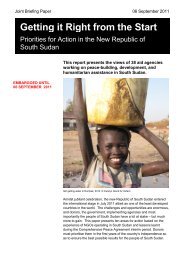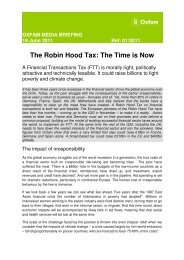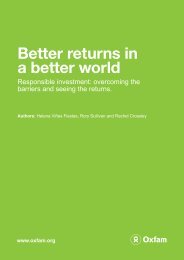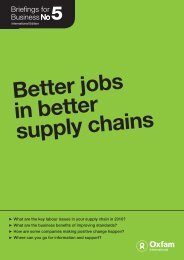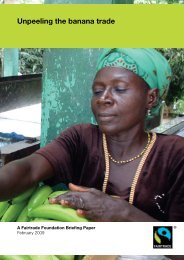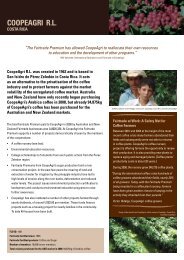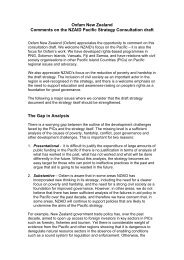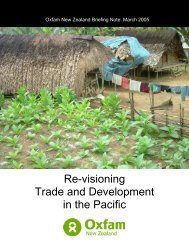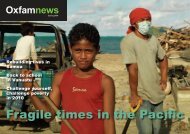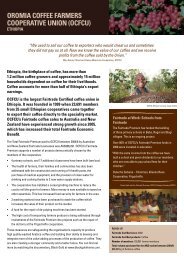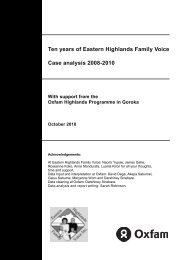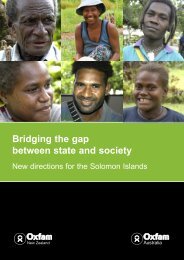Growing a Better Future - Oxfam International
Growing a Better Future - Oxfam International
Growing a Better Future - Oxfam International
- No tags were found...
Create successful ePaper yourself
Turn your PDF publications into a flip-book with our unique Google optimized e-Paper software.
3.4Buildingthe newecologicalfutureThe one thing we know for sure about the future is that itwill be different from the past. It better be. More-of–thesamedevelopment is unsustainable in every sense. It isundermining the long-term prospects for growth andprosperity, and harming the lives of the poorest peopleright now.Over the next decade we need a very rapid transition toa new model of prosperity, which delivers growth, whichrespects planetary boundaries and has equity at itsheart. The outlines of the new model are already clear,but our political leaders must overcome the inertia andvested interests that could strangle it at birth.This transition will only be possible with clear globalcommitments and frameworks for action, and effectivepolicy at national and regional levels that mobilisesinvestment and shifts the behaviour of businesses andconsumers.Equitable distribution of scarceresourcesThe journey to the future has begun. But we mustchange gear now if there is to be a happy ending. Thesoaring rhetoric from global summits on climate change,biodiversity and the green economy is not enough to fuelthis transition. Our success or failure in making thetransition to the new prosperity will depend on whetherour political leaders set clear global targets on climatechange, biodiversity, water and other issues, and adoptglobal frameworks for action that ensure a speedy andequitable transition.The UNFCCC remains the forum to set the globalframework for action on climate change, the mostpressing challenge to the new prosperity. An ambitiousand binding deal there will confirm that the transition isunderway. The G20 can develop a consensus and useits economic and financial might to shift investment andmobilise the necessary finance. But it does not have theglobal membership or the structures to deliver thetransition alone. The ‘Rio plus 20’ Summit in Brazil inJune 2012 may provide just the opportunity required.In the aftermath of Copenhagen, a fair, ambitious andbinding global framework to tackle climate changelooked a very long way off. But as climate changecontinues to gather pace, the momentum for a deal isgrowing again. It is apparent in the breathtaking speed ofChinese investment in clean energy, the determination ofmajor European countries to unilaterally increase theEU’s greenhouse gas targets, and the important stepsmade to establish a global climate fund at the 2010UNFCCC Summit in Cancun.But the pace of the negotiations remains too slow, andtheir ambition too low. Many leaders in Europe, inparticularly vulnerable countries, and in China, India,Brazil, Mexico, and South Africa, have acknowledgedthat an early shift to a low-carbon economy is thelow-cost path to long-term international competitivenessand environmental sustainability. The ‘CartagenaDialogue’, 154 which brought together developed anddeveloping countries to build bridges for the UNFCCC,has mobilised countries to move together to a lowemissionsfuture. The EU and China are in closedialogue on low-carbon pathways, building on theambition of China’s five year plan.Our challenge is to bring ever greater pressure to bearon these and other countries, to overcome the businesslobbies that have stifled progress to date. On climatechange and in other areas, we need clear global targetsfor action, and binding frameworks that give certaintyand confidence to make these goals a reality.58Opposite: Leyla Kayere, 76, weeding her tomatoes.The <strong>Oxfam</strong>-funded Mnembo Irrigation scheme hashelped 400 families in Malawi by transforming theirtraditional small low-yield crops into year-round, highvolume harvests that provide continuous food and asource of income. (Malawi, 2009)



